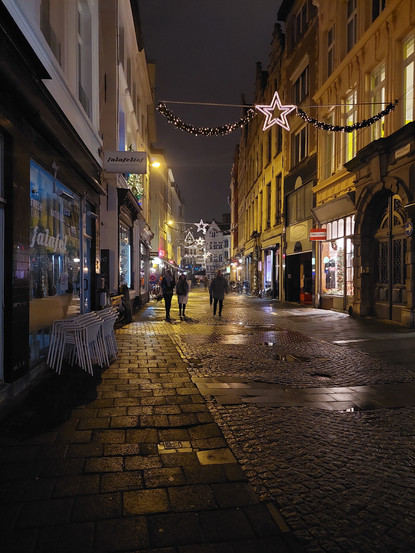
I’ll be honest. Antwerp was a surprising city. For some reason I was expecting a hyper-modern harbor city. Which in some ways it is, but its historic center is well-preserved, beautiful, and teeming with life.
It’s our first Christmas in Brussels and appropriately it’s time to see the sights. With the covidpass now being implemented in most restaurants across the country and Belgium maintaining a fairly high vaccination rate, it meant that life was beginning to resume somewhat to normal. Except the masking everywhere part, which I guess is the new norm. Whatever. At least you can’t sneeze on my tomatoes at the store while wearing a mask, you dirty bastards.
A short history
Antwerp is the largest city in Flanders, and is actually the largest city in Belgium if you don’t could metropolitan areas. For those not familiar with the regions of Belgium, you can wait for my upcoming blog on why not all Belgian beer tastes of sweet ambrosia.
Antwerp IS a gigantic port. One of the top 20 in the world. It’s tough to be a big port when you’re situated right next to a few other big ass ports, like Amsterdam, Rotterdam, Hamburg, and so on. Northern Europe is good at shipping, what can I say.

As such, they’ve got a thriving bar life and a well-regulated prostitution sector. Fun city.
The name comes from Dutch for “hand throwing”, which was quite a literal tag: A giant used to live there (imagine, even a giant to Flemish/Dutch people!) and used to demand a hand to allow people to cross the river. The giant then tossed the hand in the river for who knows what purpose. Today, they have a very efficient ferry system that does not require paying a hand to use.
Antwerp was a pre-Roman thing. Been around for a while. By the 16th century it was a thriving metropolis and took over the status as the main trading city from Bruges when people finally realized you can’t really sail to Bruges (more on that in a future blog). Antwerp made real bank in the colonial period, when blood diamonds and blood sugar (that is, sugar from slaves) became a thing and started to flood Europe through the port.
Our Lady of Antwerp's belltower has a creepy presence across the city
Antwerp, like the rest of Belgium, was constantly bouncing around from one occupant to another. Those who ruled the city—a cabal of globalist bankers—knew that trade worked best when the least questions were asked and as such they were welcoming to everyone. At the same time of the city's rise, the Inquisition was also rearing up in Spain and Antwerp became a haven for the Jewish diaspora running from the questions of brutal religious torturers. Because of this, Antwerp was quickly the center of Europe’s Jewish population. And so it goes.
Eventually, the Protestant Reformation came around and somehow the Protestants had trade figured out better than the Catholics (pro tip: usury actually gets money onto the market; this was one of the major Protestant reforms). So out with Antwerp, in with Amsterdam! Antwerp’s last moment to shine was when they were liberated by the Allies in WWII and served as the main point of import for Allied weaponry after their liberation. They got massively bombed by the Germans, so much of the old city has been extensively rebuilt, but their eye for architecture seems keen to keep old elements united with the new.
Fast forward, now Antwerpers are trying to pass themselves off as a fashion hub. Are they? I don’t know. I was there for a not-so-cold covid-cancelled Christmas. They’ve got good food though.
Dutch Christmas invasion
The Netherlands canceled their entire Christmas of 2021, going under a full and complete lockdown for dubious reasons. This blog isn’t about that though. The effect of the lockdown was that hordes of Dutchmen flew over the border to the Nederlandish-speaking Belgian cities of Antwerp, Bruges, and Ghent, packing in the restaurants and crowding the hotels, making a mockery of all the pandemic-control attempts the Dutch government tried.
Random night shots of the old town
The results of which were there being so much traffic for Antwerp, the police had to go out into the streets and force people to park the cars and use the trams. And Antwerp seems like a city that you should probably use a tram in anyway, as it’s definitely not optimized for car use. The entire city center has been renovated for pedestrians, and is quite beautiful because of it.
Lucky for us, we were there a day before that hazard hit.
Christmas during covid
Despite all the Dutchmen, Antwerp canceled their Christmas as well, just not in such a puritanical way. They just said no markets. Still there were pretty lights and even a skating rink. All the restaurants and bars were open, which meant people were still all packed inside, and now doubly so because of the situation in the Netherlands. Why not allow Christmas markets? Keep people outside for goodness sake!
They do use the covidpass quite diligently, which means you can at least be assured that the clientele are all vaccinated or have recovered from the covid within the last 6 months.
Random waterfront shots
Last thoughts and where to eat
I’m definitely heading back to Antwerp in better times (read: spring/summer when it’s raining less). It looks like a great city to explore, and our small one-night taste wasn’t really enough. On our endless search for seafood, we ate at Bia Mara. Hands down the best fish and chips (in and out of England) I’ve ever had. Very well-seasoned, with some outright adventurous flavors, including fried Spanish-style seabream and a tempura cod.
Some other things:
They used to have some canals, like Bruges and Amsterdam, but they tiled them over and used them for sewers. Now you can tour some of them (and even in a boat!).
Napoleon tried to expand the port and make Antwerp great again. But his ass was grassed at Waterloo before that could happen.








































